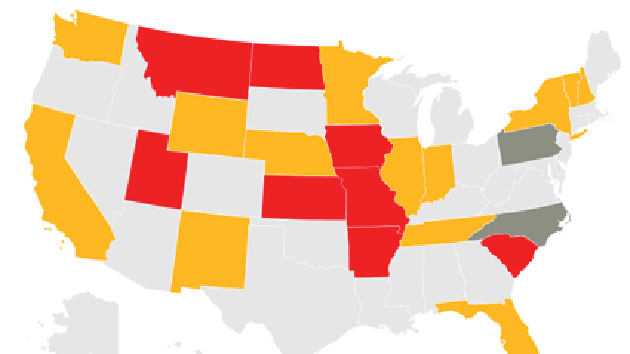Animal rights activist Amy Meyer was the first person to be prosecuted under an ag gag law for a disturbing scene she caught on tape in February at the Dale T. Smith and Sons Meat Packing Co. in Draper, Utah.
Meyer was standing on a public easement outside the barbed wire fence that encloses the slaughterhouse and recorded a tractor carrying away a downer cow and flesh coming out of a chute on the side of a building. She was approached by the manager of the company who told her she had to leave, citing Utah’s ag gag law: “If you read the rights here and the laws in Utah, you can’t film an agricultural property without my consent.”
Check out Meyer’s footage, first published this week by environmental blogger Will Potter:
Utah’s law, enacted in March 2012, makes it illegal to record, “an image of, or sound from, an agricultural operation while the person is committing criminal trespass.” Like many other states’ ag gag laws, Utah also forbids obtaining, “access to an agricultural operation under false pretenses.” As Ted Genoways’ reveals in a recent investigation for Mother Jones, laws criminalizing whistleblowing on Big Ag have been sweeping the country in the past few years. Ag gag laws were introduced in 12 states just this year, and are currently pending in Pennsylvania and North Carolina. Check out MoJo’s map to see where these bills have passed and failed.
Meyer used to pass by the slaughterhouse on her way to volunteer at a local animal sanctuary in Draper, where the mayor is a co-owner of the meat-packing plant, and felt compelled to, “do more to fight what’s happening to cows inside factory farms and slaughterhouses,” she told Mother Jones. After she filmed the downer cow incident and then a confrontation with Smith and Sons’s manager, police arrived to question Meyer, but did not detain her. She was later charged with “agricultural operation interference.” As shown by the video, Meyer was standing on public property while recording, which was why the prosecutor ultimately dropped the charges on April 30, after Potter publicized the case.
On May 18, hundreds of local activists gathered outside the slaughterhouse to protest the state’s ag gag law. A spokesperson for the plant told ABC News, “the meat processing facility is inspected daily and has a good record for animal care,” and the company maintained in a written statement that their “animal handling and treatment practices are humane and responsible.”
However, as Meyer points out to the plant’s manager in the video, more transparency is in order: “Why are you concerned about being filmed, if you think this is a legitimate business?”

















